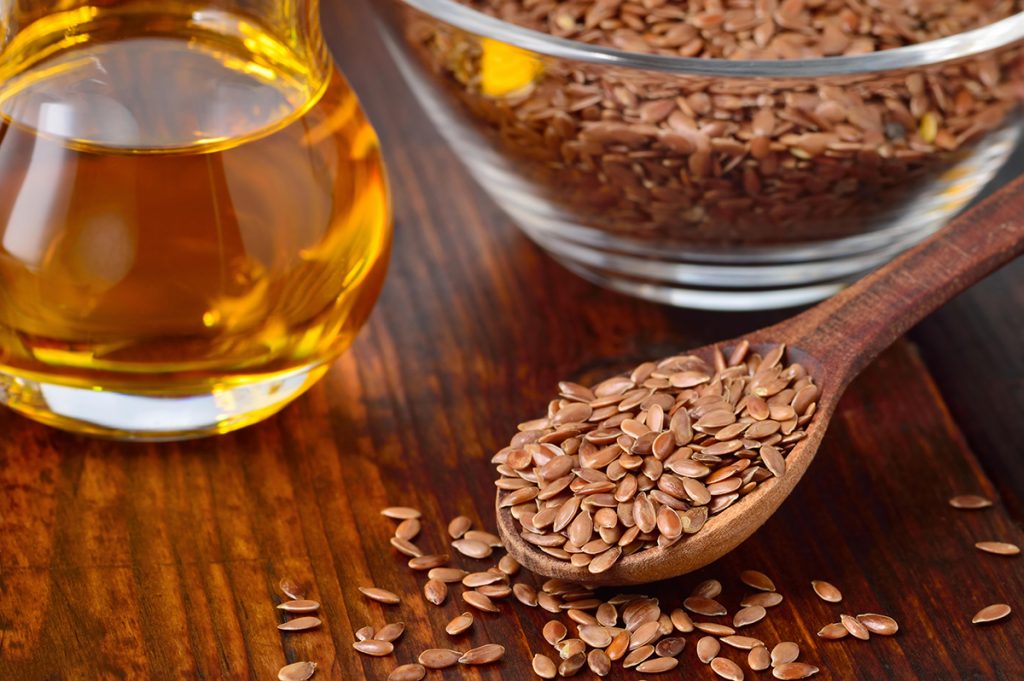A Healthy Heart Equals a Healthy Mind
 You’ve heard or read over and over that you have to eat right and exercise to keep your heart healthy. Well, not only do unhealthy habits impact your heart they also affect your brain.
You’ve heard or read over and over that you have to eat right and exercise to keep your heart healthy. Well, not only do unhealthy habits impact your heart they also affect your brain.
French researchers studied 5,123 men and women over a 17-year period of time. Participants with the greatest number of unhealthy behaviors were three times more likely to have poor thinking abilities and twice as likely to have memory problems compared to those living healthier lifestyles.
There are four lifestyle factors associated with negative health effects:
Continue reading
Does flaxseed have to be ground?
I had an individual just send me the following message:
I was just on your web site and was reading about Omega-3’s. I am a little confused. Does flaxseed have to be ground in order for it to work? Are gel capsules a waste of time and money?
In case you are wondering too, here’s the answer:
Yes, in order for the body to access the omega 3’s within the flaxseed, the seed must be ground. Otherwise it passes through the system as dietary fiber. Dietary fiber has it’s own benefits, but if you are wanting the omega 3 benefits of flaxseed it must be ground.
Flaxseed oil (gel capsules) provide the omega 3’s without the fiber. If you are going to purchase an omega 3 supplement, my first choice would be fish oil instead of flaxseed oil. They provide different types of omega 3 fatty acids. Greater benefits linked to omega 3’s in fish oil.
All the best,
Lisa Nelson RD
https://lisanelsonrd.com
Ginkgo to Treat Peripheral Vascular Disease
 Ginkgo is an herbal extract available in supplement form. If comes from the leaves of the ginkgo tree and is believed to improve circulation and cognitive abilities.
Ginkgo is an herbal extract available in supplement form. If comes from the leaves of the ginkgo tree and is believed to improve circulation and cognitive abilities.
Some of the functions associated with Ginkgo include:
Decreased platelet aggregation (blood clotting)
Decreased inflammation
Improved memory and brain function
Improved circulation
Mood Enhancement
Increased serotonin receptors
Increased glucose uptake
Increased oxygen supplied to the brain
Antioxidant
The recommended daily dose of Ginkgo may vary between 60 to 120 mg/day.
There are potential side effects associated with the herbal remedy, such as headaches, nausea, vomiting, and dizziness. If you take blood thinners, such as Coumadin, or monoamine oxidase inhibitors (MAOIs) ginkgo is not recommended. MAOIs are a class of antidepressant drugs. Discuss any supplements you take or are considering with your doctor. There is potential for a drug-nutrient interaction.
There has been some evidence to indicate that Ginkgo can be used to treat a variety of health conditions. A few of the health conditions include:
Continue reading
Tips to Add Flax to Your Diet

Flax is an oilseed similar to canola and sunflower being oilseeds. Flaxseeds are derived from flax.
Benefits of Adding Flax to Your Diet
There are many benefits associated with adding flax to your diet, which are derived from a different part of the flaxseed. You have the heart-healthy fat content, the fiber, and the lignan.
Lignan’s are a class plant compounds called phytoestrogens that act as antioxidants.
Some of the health benefits that may be associated with flax include:
Continue reading
New Warnings Added to Statin Drug Label by the FDA
 Do you take statin medication to keep your cholesterol levels within normal?
Do you take statin medication to keep your cholesterol levels within normal?
A warning label is being added to statin medications, including Lipitor, Crestor, and Zocor. The warning is to make users aware that the medication may raise blood sugar levels and cause memory loss.
Statins are frequently prescribed by doctors because studies have shown the effectiveness of the drug to reduce the risk of heart attack and heart disease. However, it’s important that patients and doctors are well aware of the negative side effects linked to the medication.
In addition to elevated blood sugar and memory loss, some of the potential side effects of statin medications include:
Continue reading
C-Reactive Protein Good Heart Attack Predictor
 For quite awhile now, I’ve been encouraging you to look at more than just your standard cholesterol panel to assess your risk for heart disease. I’m going to share the findings of an expert panel that supports this need.
For quite awhile now, I’ve been encouraging you to look at more than just your standard cholesterol panel to assess your risk for heart disease. I’m going to share the findings of an expert panel that supports this need.
In the Journal of Clinical Lipidology a panel of specialists concluded that patients considered at intermediate risk for heart disease be tested for C-reactive protein. It’s likely this applies to a majority of the U.S. population since overweight and obesity is rampant. Family history, diet, exercise, and tobacco use also factor into determining if you are at intermediate risk.
Just evaluating total cholesterol, LDL cholesterol, and HDL cholesterol does not work well for predicting heart attack and stroke risk, especially for patients with metabolic syndrome or diabetes. It’s even more difficult to evaluate risk if a patient is using cholesterol lowering statin medications.
C-Reactive Protein
C-Reactive protein is a marker for inflammation and is associated with plaque build up in blood vessel walls. The plaque build up in coronary arteries leads to narrow arteries, which can cause chest pain. If these arteries rupture you are dealing with a heart attack or stroke.



